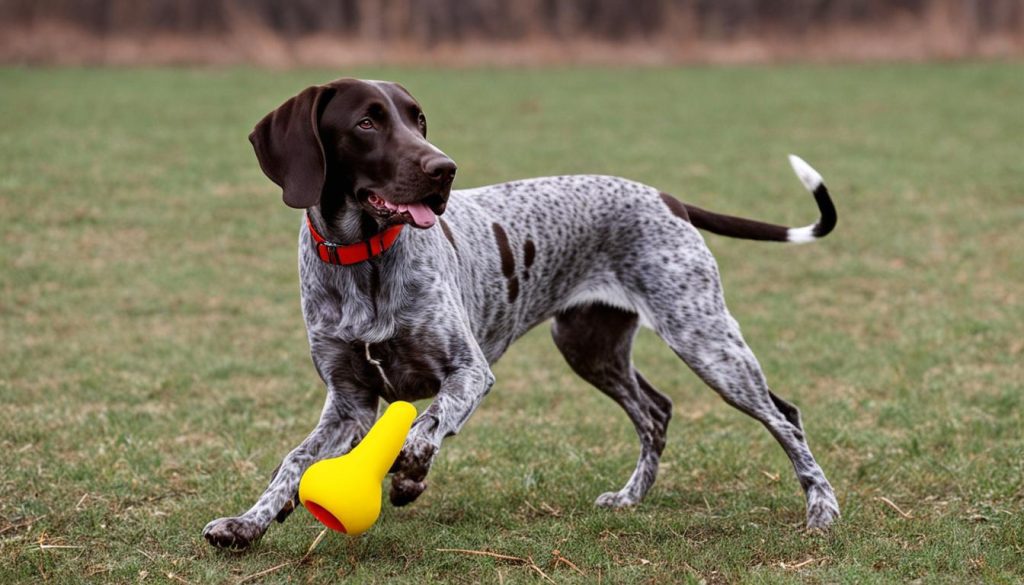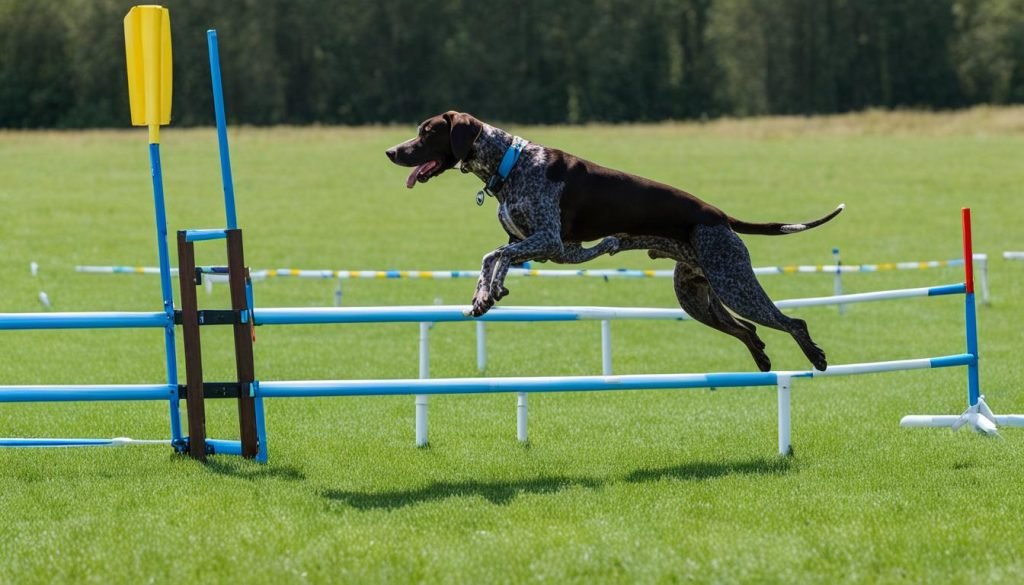As a proud German Shorthaired Pointer owner, I know firsthand the joy and challenges that come with this energetic breed. While these dogs are known for their strength and athleticism, they can sometimes exhibit behavior problems that need to be addressed. In this article, we will explore some of the common German Shorthaired Pointer behavior issues and provide insights into how to manage and overcome them.
German Shorthaired Pointers are lively and active dogs that require mental and physical stimulation to prevent boredom and destructive behaviors. Whether you have an indoor or outdoor GSP, it’s important to provide them with ample exercise opportunities to release their energy. Otherwise, they may develop behavior problems such as hyperactivity, excessive barking, and destructive chewing.
Additionally, socialization is key to ensuring that your German Shorthaired Pointer interacts well with both people and other animals. Early socialization and training can help prevent any aggressive behaviors from developing. Separation anxiety is another common behavior issue in this breed, so it’s crucial to acclimate your GSP to being alone gradually and provide mental stimulation to keep them occupied.
In this article, we will delve deeper into these behavior issues and provide training tips and techniques to help you address and manage them effectively. Understanding your German Shorthaired Pointer’s behavior is essential for creating a harmonious and happy life together. So let’s dive in and explore the fascinating world of German Shorthaired Pointer behavior!
Size and Exercise Needs of German Shorthaired Pointers
German Shorthaired Pointers (GSPs) come in different sizes. Male GSPs typically reach heights of 21″-27″ and weigh between 55-75 lbs, while females are generally 20″-25″ tall and 40-65 lbs in weight.
Due to their high energy levels, GSPs require regular exercise to maintain their physical and mental well-being. It is crucial to meet their exercise needs to prevent behavior problems such as hyperactivity, excessive barking, and destructive chewing.
GSPs thrive with daily runs, walks, or play sessions in a secure area. They love engaging in activities that challenge their athleticism and stimulate their senses. By providing ample opportunities for exercise, you can help them release their pent-up energy and prevent boredom.
Socialization and Aggression in German Shorthaired Pointers
German Shorthaired Pointers are generally friendly and good-natured, but their behavior towards strangers can vary. Some may be very friendly, while others may display more reserved or protective behavior. However, aggression is not a typical trait of this breed. While most GSPs get along well with other pets, some individuals can be aggressive towards unfamiliar dogs. It’s important to socialize them early and provide proper training to prevent any aggressive behaviors from developing.

Separation Anxiety and Destructive Behavior in German Shorthaired Pointers
German Shorthaired Pointers are known for their strong bond with their owners and have a tendency to develop separation anxiety if left alone for long periods of time. This can result in destructive behaviors such as chewing on furniture, excessive barking, and digging. To prevent separation anxiety, it’s important to gradually acclimate them to being alone and provide them with mental stimulation and toys to keep them occupied. Crate training can also be beneficial in providing them with a safe and secure space when left alone.
Excessive Barking and Resource Guarding in German Shorthaired Pointers
German Shorthaired Pointers are lively and energetic dogs that require regular exercise and mental stimulation. Without proper outlets for their energy, they may exhibit excessive barking behaviors. Excessive barking can be a result of boredom, anxiety, or a way of alerting their owners to potential threats. It’s important to address this behavior early on through consistent training and providing them with enough physical and mental stimulation.
In addition to excessive barking, some German Shorthaired Pointers may also display resource guarding behavior. Resource guarding refers to a dog’s possessiveness over their toys, food, or other valuable items. This behavior can be concerning and may lead to aggression if not properly managed. To prevent resource guarding, it’s crucial to establish a clear hierarchy within the household and teach your GSP appropriate boundaries from a young age. Training and socialization are key in addressing resource guarding and ensuring a well-rounded and obedient companion.
Fear and Anxiety in German Shorthaired Pointers
German Shorthaired Pointers are known to be sensitive and can experience fear and anxiety, particularly when they lack proper socialization or have had negative experiences in the past. Loud noises, unfamiliar environments, and separation from their owners are commonly triggers for fear and anxiety in GSPs. To help alleviate their stress, it’s crucial to create a calm and secure environment for them.
One effective approach to address fear and anxiety in German Shorthaired Pointers is through positive reinforcement techniques. By using rewards and praise, you can build their confidence and help them overcome their fears. This helps them associate positive experiences and emotions with situations that may have previously caused them distress.
Training Tips for German Shorthaired Pointer Behavior Issues
German Shorthaired Pointers are highly intelligent and eager to please, making them relatively easy to train. However, their strong will and independent nature can sometimes make training a challenge. To address behavior issues in GSPs, here are some effective training tips:
1. Use Positive Reinforcement Techniques
Positive reinforcement is a powerful tool when training German Shorthaired Pointers. Use treats, praise, and rewards to motivate your GSP and keep training sessions engaging. By rewarding good behavior, you encourage your dog to repeat it.
2. Be Consistent and Patient
Consistency is key when training your GSP. Set clear rules and boundaries, and always enforce them. Be patient with your dog and understand that some behaviors may take time to change. Rushing or losing patience can hinder progress.
3. Start Obedience Training Early
Starting obedience training at a young age is crucial for preventing behavior issues in German Shorthaired Pointers. Teach basic commands like sit, stay, and come, and gradually progress to more advanced training. Socialization with other dogs and people is also important to ensure your GSP becomes well-rounded.
4. Address Distractions
GSPs can be easily distracted, so it’s important to address this during training. Start training sessions in a quiet and familiar environment, gradually introducing distractions as your dog becomes more focused. Use high-value treats to keep their attention on you.
5. Seek Professional Help if Needed
If you’re struggling with training your GSP or dealing with severe behavior issues, don’t hesitate to seek professional help. A certified dog trainer or behaviorist can provide tailored strategies and guidance to address specific challenges.
By implementing these training tips, you can successfully address behavior issues in your German Shorthaired Pointer and foster a well-behaved and happy canine companion.

Is a German Shorthaired Pointer Right for You?
Before considering a German Shorthaired Pointer as a furry addition to your family, it’s crucial to understand their specific temperament and needs. While they can be amazing companions, it’s essential to take into account their energetic nature and potential behavior issues.
German Shorthaired Pointers have high energy levels, requiring regular exercise to keep them mentally and physically stimulated. This may not be suitable for individuals or families with a more sedentary lifestyle or limited time for daily activities. Without adequate exercise, these dogs may develop behavioral problems, such as excessive barking or destructive behaviors.
Another aspect to consider is their inclination towards separation anxiety. These dogs form strong bonds with their owners and can become distressed when left alone for long periods. If you have a busy schedule or aren’t able to provide them with the attention and companionship they need, a German Shorthaired Pointer may not be the ideal breed for you.
Furthermore, early training and socialization are crucial for German Shorthaired Pointers, as they have a prey drive and a potential tendency for resource guarding. Proper training can help mitigate these behaviors, but it requires time, consistency, and patience from the owner. If you are unwilling or unable to invest in their training and socialization needs, it’s important to consider a different breed.






